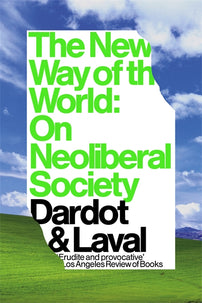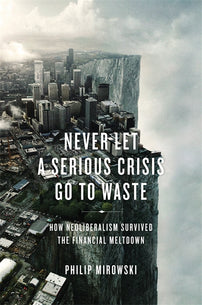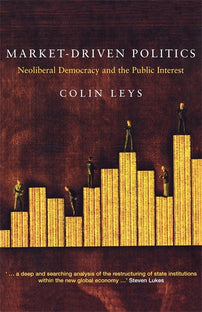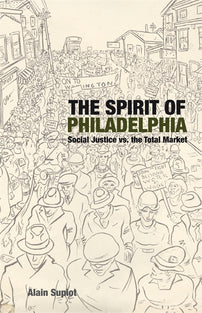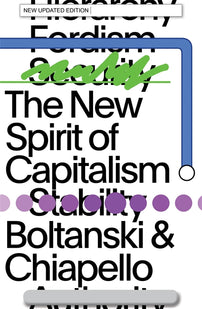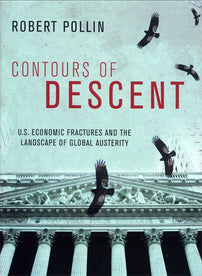Against the Neoliberalism Taboo
Rather than be discarded, the term "neoliberalism" needs to be defined with greater precision.

First published at Focaal blog.
Daniel Rodgers has written the latest would-be obituary for neoliberalism as a category of analysis, hot off the press in the first 2018 issue of Dissent magazine. Like Rajesh Venugopal and Bill Dunn before him, he creates a typology of the term’s use before concluding its analytical and political uselessness. Personally, I remain invested in seeking greater precision for the term rather than discarding it. The transformations, competing definitions, and contradictions of a term like liberalism or socialism have not led us to jettison those terms, so why this one?
Beyond that, to say that more precise terms are available fails to convince. A case in point is Rodgers’s proposal to substitute “market fundamentalism” for the intellectual project of neoliberalism. The term gives the false impression that neoliberals believed in a “free, unsteered market,” as he puts it. Yet, as every history of neoliberal thought has made clear, the project is about reengineering, not discarding, the state. In my forthcoming book, I suggest that “encasing” the market is more accurate than “liberating” it. Adopting Rodgers’s “market fundamentalism” instead misleads the critic into thinking they have found inconsistency, incoherence, or hypocrisy whenever the state appears. Yet, neoliberalism is a form of regulation, not its radical Other. Even a superficial reading of the primary texts of neoliberals makes this clear. Milton Friedman’s Economic Bill of Rights, James M. Buchanan’s fiscal constitutionalism, F. A. Hayek’s Constitution of Liberty, Gottfried Haberler’s proposals for GATT, Ernst-Joachim Mestmäcker on European competition law, William Landes and Richard Posner on intellectual property rights — the list goes on.
Intellectual networks are not a Rosetta Stone to understand neoliberalism as a whole, but they can be a helpful starting point. Following the Mont Pèlerin Society (MPS) past 1947 and beyond, Hayek would lead to an encounter with much of the research Rodgers credits as the “real engine of the economic theory of neoliberalism.” He cites human capital theory (pioneered as part of the “economic way of looking at life” by Gary Becker, MPS president 1990–1992), public choice theory (developed by MPS member Gordon Tullock and Buchanan, MPS president 1984–1986). One could add the law-and-economics approach of Richard Epstein, Ronald Coase, Henry Manne, and Posner (all MPS members); the idea of “regulatory capture” developed by George Stigler (MPS president 1976–1978); or the counterrevolution in development economics pioneered by Peter Bauer and Deepak Lal (both members, the latter president from 2010–2012).
Many if not all of these ideas were discussed collectively, not in the sense of airtight schemes hatched on Mont Pèlerin, but in the sense of forthright often critical engagement in (easily accessible) journals. The real obstacle to gaining an overview of this discourse is time, which is why it is helpful that scholars like Bernhard Walpen, Rob Van Horn, Naomi Beck, Will Davies, Werner Bonefeld, Eddie Nik-Khah, Melinda Cooper, and many others have done such a great job of synthesizing vast amounts of writing.
As for think tanks, scholars and activists have been tracing the connections between neoliberalism as intellectual and policy project for a quarter century (Radhika Desai on “second-hand dealers in ideas” in New Left Review in 1994 was a pioneer). The list of think tanks founded by MPS members is almost a cliché at this point, but necessary to recount if one (here Rodgers) chooses to ignore it: the Institute of Economic Affairs founded by Antony Fisher in 1955; the Institute for Humane Studies founded by F. A. Harper in 1961; the Heritage Foundation founded by Ed Feulner in 1973 (MPS president 1996–1998); the Fraser Institute founded by Fisher in 1974; the Manhattan Institute founded by Fisher in 1977; the Cato Institute founded by Ed Crane, Charles Koch, and Murray Rothbard in 1977. The Atlas Network, founded by Fisher in 1981 and run under the long-time leadership of Alejandro Chafuen, now counts more than 457 member organizations in more than 96 countries. One can debate the influence of these think tanks — and one should. But to suggest that the intellectuals and the think tanks exist in different analytical silos is odd, especially since Rodgers explored some of the connections in his own Age of Fracture.
Lastly, on the evergreen point that nobody calls themselves neoliberals — even if one opts for nominalism (would this make the NSDAP, the National Socialist German Workers’ Party, a socialist worker’s party?), it’s noteworthy that the Adam Smith Institute (founded by MPS members Eammon and Stuart Butler) “came out as neoliberals” in 2016. Internally, many MPS folks (especially German-speaking) use the term without too much angst, and have done so for some time already. In my experience, what annoys them is (like their critics) the baggy imprecision of the word more than the word itself. MPS member Hans Willgerodt (Wilhelm Röpke’s nephew) offered a helpful internal self-definition in 2006: “neoliberals recognized that the fundamental task was establishing the role of the state both more clearly and differently … it was neoliberals furthermore who pointed out the extra-economic conditions for a free economic system.”
If one reads the writings of actual neoliberals, one finds a renewed attention to culture, institutions, and values since the end of the Cold War; not endless defibrillations of homo economicus. This helps explain, for example, the new Department of Political Economy and Moral Science at the University of Arizona established through the university’s Freedom Center, which received $1.8 million in Koch Foundation funding, Charles Koch’s recent $10 million donation to relaunch the business school at the Catholic University of America and Chafuen’s new parallel position as managing director of the Acton Institute, dedicated to “integrating Judeo-Christian Truths with Free Market Principles.” The new head of the Heritage Foundation is a cultural conservative with a background in anti-abortion activism rather than economics. Cooper’s book Family Values is brilliant on this connection. It is also helps explain how certain strains of “right-wing populism,” especially in Germany and Austria, are varieties of neoliberalism rather than its opposite.
Scholars can do better — and have done better — by using categories carefully and placing them in time and space rather than excising from the analytical dictionary. To place a taboo on categories, especially those as slippery as neoliberalism, might be the true act of mystification and obfuscation.
Quinn Slobodian is an ACLS Frederick Burkhardt fellow at Harvard University’s Weatherhead Initiative on Global History and an associate professor of history at Wellesley College. He is the author of Comrades of Color: East Germany in the Cold War World (Berghahn Books, 2015). His most recent book is Globalists: The End of Empire and the Birth of Neoliberalism, forthcoming from Harvard University Press.
[book-strip index="1" style="display"]
